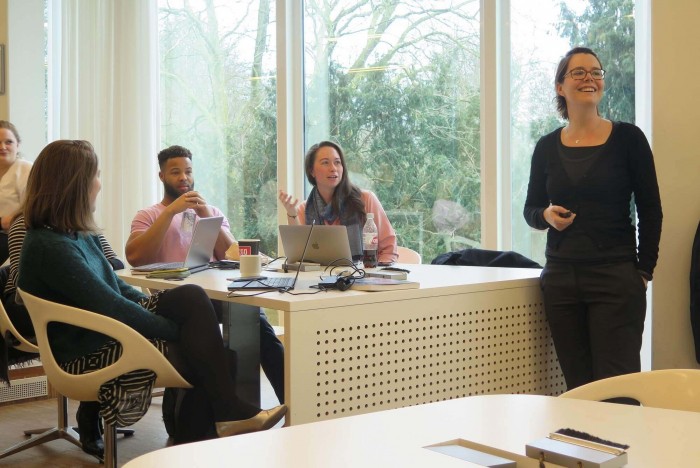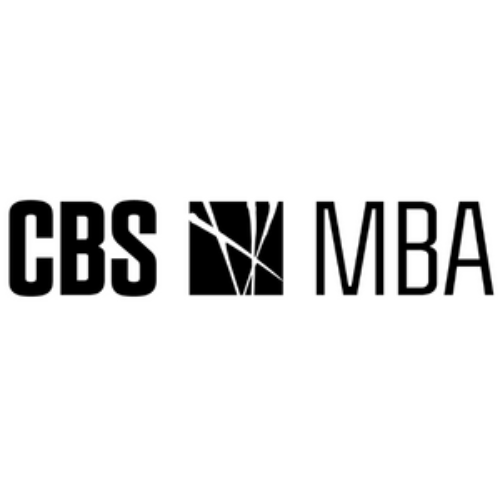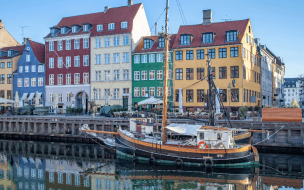Copenhagen Business School’s Net Impact chapter was awarded gold status this year for its MBA students’ commitment to sustainability
Sustainability is the thread that weaves together the Copenhagen Business School MBA. Just ask Rachel Browning.Rachel (pictured below, right) graduated from the Copenhagen MBA this year and is the outgoing vice president for the school’s Net Impact chapter—her year were awarded gold status for their commitment to sustainability.

Net Impact is a global organization that accelerates leadership development for tomorrow’s leading sustainable business figures— is the chapter’s only arm in Denmark.
By angling students to create sustainable impact, Rachel says the chapter empowered her and her MBA peers to do go out and do the things they wanted to around sustainability. They had no excuses not to, she adds.
Rachel says the chapter pushes students to think outside the box, and to bring innovation to the table when it comes to planning activities. Her team invited social justice journalists to talk and debate with the class, for example.
They also created a mock supply chain scenario whereby different teams represented coffee growers, the government, and the workers on a farm. They were then given different challenges to deal with and were pushed to respond with quick-fire, creative solutions.
Food security is an issue that is close to Rachel’s heart. Thus, she also planned for a local business tackling the issue to come in to discuss the challenges they face with the students. Their mission is to promote the use of insects as a sustainable food source.
“I found in Denmark that the process of [implementing] sustainability [in companies] weren’t just projects on the side,” Rachel explains.
“The best examples were where sustainability was a core driver and at the center of the business model. In putting sustainability at the center of the brand and strategy they differentiate themselves.”
An interest in sustainability has always been on Rachel’s mind. But her pursuit of an MBA came from a desire to think more innovatively and creatively when tackling business problems.
This was brought to her attention while she was working in the financial services industry in Cape Town, South Africa, before she pursued the Copenhagen MBA. She noticed one of her colleagues thinking and acting in a more dynamic way to the rest of the team.
She soon took note of their approach to problem solving and critical thinking, realizing what she was seeing were the benefits of an MBA being played out before her eyes.
An MBA had been on Rachel’s radar for a number of years, she explains, and so after seeing first-hand the benefits of business school in the workplace, she began to do her research. She says she was in the market for an MBA that would give her a full immersion into the principles of sustainability and corporate social responsibility.
It’s no surprise, then, that came out on top. Rachel made the move to Denmark and joined a school among the best in the world for sustainability, according to the Corporate Knights’ Better World MBA ranking.
New associate dean for the Copenhagen MBA, Andreas Rasche (pictured below, right), says that the Net Impact chapter is a key indicator of the program’s strength in this area.
“I think it’s very important because that impact is student driven,” he says, adding that the signals coming from student-led initiatives in this area multiply credibility tenfold.

For Andreas, it’s vital sustainability is integrated into the entire curriculum and doesn’t surface solely as a standalone course. “One thing that you need to do within such a context is send credible signals to the students that you really care about these things,” he says.
“For instance, when a finance professor talks to them he or she is not only talking about maximizing profit, but also explaining how this debate could relate to sustainability.”
He mentions that regularly invite in guest speakers from corporations that are sustainability thought leaders. This allows both students and faculty to keep abreast of the latest industry trends, and the latest challenges companies in this area are facing.
And, he has some key messages for his students.
“What I always tell them is that, ideally speaking, corporations would be designed in a way where they fully acknowledge the challenges of sustainability and are strategically designed in a way that minimizes risk and maximizes opportunity.
“But, I wouldn’t say at the end of the day every corporation would end up in such a situation.”
A lot of it comes down to values, too, he says. If you don’t add values to your work, then Andreas questions whether you really are a sustainability leader.
“It’s a lot about personal values and managing for organizational integrity,” he concludes. “It’s not just knowing the technical details that matters.”
Student Reviews
Copenhagen Business School (CBS)
CBS: efficient international network
CBS has always been ranked among the best universities in Europe and this means that it has become a sign of professionalism and success.
The academic level is great thanks to the good teachers and the atmosphere is proactive and challenging. Lots of events are planned every week and this helps you to find your own way.
CBS is not only a business school, it is a great and efficient international network.
Good academic career
I did my Bachelors at CBS and their academic excellence and career opportunities led me to pursue my Masters in Accounting, Strategy and Control. I was very lucky to go on an exchange in Singapore for one semester it boosted me to get a career in a global firm. I like that it is super modern and has all the facilities for the business student in 2019. Especially, I liked the library and Bitlab where I spent most of my time studying. However, note that it is very demanding and studying here is no joke. Everything is very competitive and you are among the most excellent business students in the country. The interaction with international students helped me to see different perspectives in business and culturally and I was lucky to make friends from any part of the world. CBS is like a brand in Denmark. Every serious business company prioritizes us over any other Danish university and also it is free for European citizens. Overall, I have a very satisfying experience at CBS and I'm looking to continue my academical career even further.
CBS is one of the best!
All I have to say regarding my experience at CBS is that it is AMAZING. Having been tutored by world-class academic staff, I can definitely support that I am receiving the best of quality regarding my studies in Digital Marketing. Staff is very friendly and easy to approach. In addition, the facilities we enjoy are top class and meet any demands. Keep in mind that, EU citizens do not pay any fees. Student life might be non-existent here, but the location of the University in The very center of Copenhagen has a huge variety of choices to offer to students regarding their entertainment. Accommodation might be a problem, but early research of the market can be very useful. In addition, the University promotes diversity. In CBS University you can meet people from the whole world which is quite interesting. I definitely suggest CBS for any student who he's interested in pursuing a career in marketing or business.
The ideal business school
I have been enrolled in this university for 2 semesters. What I took from this experience is that there is nothing better out there for those looking for professional growth while being guided by some of the top-notch professors in Scandinavia. They have a really strong focus in technology and digital transformation and they are up to date to guarantee you land a job in the modern fast-evolving world. They also embrace diversity which means many students come from any part of the world and it takes the entire learning experience to another level. You simply learn from every other student cause everyone has different experiences and background which makes you open your mind and see the world from a different angle. In Denmark, even businesses prioritize people who graduate from CBS as it's commonly perceived as the most prestigious university for business graduates.
A Place of Personal Growth
In CBS you can expect an environment of proactive thinking and growth.
The university staff is always open to help and to debate. The teaching methods balance theoretical knowledge and practical skills enabling the student with capacity and confidence to enter the job market successfully. The existence of students from all over the world stimulates discussion and promotion of different cultures, ideas and perspectives. I highly recommend this university for students in business-related areas.
Environment
The environment here is really great. Despite the well organized buildings and libraries, there are also places for students to just stay and relax also even study in the corners of each campus. The professors are mostly really nice and try to interact with students a lot. So, to sum up, the environment is really nice for studying here.
Quality education
Quality education where it emphazises the importance of academic. No finger to put on this aspect of the school.
However, sometimes the administration and IT can be lacking a bit, but in general a really good choice for education!
Best Time!
Classes are challenging and conducted in a professional manner. CBS offers a wide range of possibilities to develop outside of the classes! Libraries and other facilities on the campus are very well adjusted to the student needs.
A heavily theory-based curriculum combined with an ever-stimulating environment
I am currently a Master student at CBS, but I have also completed a Bachelor's Degree in this university. I am quite satisfied with my studies and the teaching level. However, when compared to other business schools, it becomes apparent that most courses at CBS strive to find a good balance between theoretical insight and real-life examples. Compared to my exchange university, the projects that I have found myself writing at CBS have a far less practical application and also leave little room for creativity. If the teaching is heavily theoretical, on the bright side, the university arranges a number of events throughout the year to encourage students to apply their knowledge, in the form of career fairs, case competitions, and other events organized by student associations. In my experience, teachers are very easily approachable and happy to answer your questions. A foreign student like me will find a more international environment at Master level, since the number of international (or at least non-Scandinavian) students enrolled in the Bachelor programs is quite low. However, all communication (both oral and written) from teachers and the university offices is always in English. Administrative offices, student guidance services, the career center, and the international office are definitely worth a mention. All of the requests that I have had throughout the years have always been met with kindness, promptness and efficiency.
CBS: efficient international network
CBS has always been ranked among the best universities in Europe and this means that it has become a sign of professionalism and success.
The academic level is great thanks to the good teachers and the atmosphere is proactive and challenging. Lots of events are planned every week and this helps you to find your own way.
CBS is not only a business school, it is a great and efficient international network.
Good academic career
I did my Bachelors at CBS and their academic excellence and career opportunities led me to pursue my Masters in Accounting, Strategy and Control. I was very lucky to go on an exchange in Singapore for one semester it boosted me to get a career in a global firm. I like that it is super modern and has all the facilities for the business student in 2019. Especially, I liked the library and Bitlab where I spent most of my time studying. However, note that it is very demanding and studying here is no joke. Everything is very competitive and you are among the most excellent business students in the country. The interaction with international students helped me to see different perspectives in business and culturally and I was lucky to make friends from any part of the world. CBS is like a brand in Denmark. Every serious business company prioritizes us over any other Danish university and also it is free for European citizens. Overall, I have a very satisfying experience at CBS and I'm looking to continue my academical career even further.
CBS is one of the best!
All I have to say regarding my experience at CBS is that it is AMAZING. Having been tutored by world-class academic staff, I can definitely support that I am receiving the best of quality regarding my studies in Digital Marketing. Staff is very friendly and easy to approach. In addition, the facilities we enjoy are top class and meet any demands. Keep in mind that, EU citizens do not pay any fees. Student life might be non-existent here, but the location of the University in The very center of Copenhagen has a huge variety of choices to offer to students regarding their entertainment. Accommodation might be a problem, but early research of the market can be very useful. In addition, the University promotes diversity. In CBS University you can meet people from the whole world which is quite interesting. I definitely suggest CBS for any student who he's interested in pursuing a career in marketing or business.
The ideal business school
I have been enrolled in this university for 2 semesters. What I took from this experience is that there is nothing better out there for those looking for professional growth while being guided by some of the top-notch professors in Scandinavia. They have a really strong focus in technology and digital transformation and they are up to date to guarantee you land a job in the modern fast-evolving world. They also embrace diversity which means many students come from any part of the world and it takes the entire learning experience to another level. You simply learn from every other student cause everyone has different experiences and background which makes you open your mind and see the world from a different angle. In Denmark, even businesses prioritize people who graduate from CBS as it's commonly perceived as the most prestigious university for business graduates.
A Place of Personal Growth
In CBS you can expect an environment of proactive thinking and growth.
The university staff is always open to help and to debate. The teaching methods balance theoretical knowledge and practical skills enabling the student with capacity and confidence to enter the job market successfully. The existence of students from all over the world stimulates discussion and promotion of different cultures, ideas and perspectives. I highly recommend this university for students in business-related areas.
Environment
The environment here is really great. Despite the well organized buildings and libraries, there are also places for students to just stay and relax also even study in the corners of each campus. The professors are mostly really nice and try to interact with students a lot. So, to sum up, the environment is really nice for studying here.
Quality education
Quality education where it emphazises the importance of academic. No finger to put on this aspect of the school.
However, sometimes the administration and IT can be lacking a bit, but in general a really good choice for education!
Best Time!
Classes are challenging and conducted in a professional manner. CBS offers a wide range of possibilities to develop outside of the classes! Libraries and other facilities on the campus are very well adjusted to the student needs.
A heavily theory-based curriculum combined with an ever-stimulating environment
I am currently a Master student at CBS, but I have also completed a Bachelor's Degree in this university. I am quite satisfied with my studies and the teaching level. However, when compared to other business schools, it becomes apparent that most courses at CBS strive to find a good balance between theoretical insight and real-life examples. Compared to my exchange university, the projects that I have found myself writing at CBS have a far less practical application and also leave little room for creativity. If the teaching is heavily theoretical, on the bright side, the university arranges a number of events throughout the year to encourage students to apply their knowledge, in the form of career fairs, case competitions, and other events organized by student associations. In my experience, teachers are very easily approachable and happy to answer your questions. A foreign student like me will find a more international environment at Master level, since the number of international (or at least non-Scandinavian) students enrolled in the Bachelor programs is quite low. However, all communication (both oral and written) from teachers and the university offices is always in English. Administrative offices, student guidance services, the career center, and the international office are definitely worth a mention. All of the requests that I have had throughout the years have always been met with kindness, promptness and efficiency.










